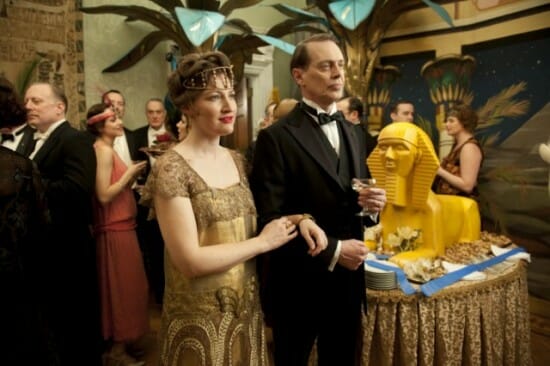Boardwalk Empire: “Resolution” (Episode 3.01)

While watching the opening sequences in this week’s Boardwalk Empire premiere, I couldn’t help but think back to some advice Jimmy Darmody received from a local elder in the middle of season two: “Not every insult requires a response.”
As the first murder in the premiere’s line-up suggests, newcomer Gyp Rosetti (played by Bobby Cannavale) is, like Capone, in the “everything requires a response” camp. Within the first few minutes, he whacks a guy (who was simply trying to offer him roadside assistance) for insulting his lack of 3-In-One knowledge and then steals his dog (more on that in a sec). The second murder of the morning immediately follows, and although exhibiting similar handwringing (like Rosetti, there are several beats of uncertainty on which way Nucky is going to go), it was clearly the smoother operation. Nucky works his captor—a man who robbed his warehouse—just like he once worked his constituents: earning his trust through universal platitudes (in this case, on the importance of breakfast and family) and body language (removing his hat), then inspiring hope (“You were only doing your job”), all before finally making his move (in this case, ordering the hit).
Both murders establish different brands of cruelty, and it’s not long before the show sets these men up as full-on foes. At his New Year’s party that night, Nucky makes an important announcement in the lair: he will only be supplying Rothstein from here on out as a “favor” to his friends in high places. Rosetti does not take to this idea and lunges into his already familiar brand of tantrum. After hurling very targeted epithets at each of the men in the room, he accuses them of not being able to “take a joke,” and then snatches his dog (who he’s rechristened “Scruffy”) as he storms out of the room.
But in the most absurd moment of all, he marches up to Margaret, graciously thanks her for her hospitality, and bestows on her Scruffy (for the children, he tells her). Nucky’s face throughout this latter interaction is priceless. His expression moves from stunned to dark, presumably registering the potential danger of this man. Thanks to his wiles, he managed to keep the peace momentarily, but this is clearly the beginning of something bad. Bad for Nucky, anyway. Good for us. Like many of Boardwalk’s most morally ambiguous characters, there’s something very appealing about Rosetti. The man may be ruthless, but it clearly stems from sensitivity, which can bubble up in pretty funny ways (see his “That’s OK, I wasn’t really interested in finishing my thought,” to Eddie Cantor upon interrupting his conversation with Nucky earlier in the night.). This leads me to reflect, for a moment, on one of the things that’s excellent about this show: it subverts the typical gangster archetype by furnishing these men with real issues and quirks (see Mickey Doyle, always in trouble, yet…still laughing).
-

-

-

-

-

-

-

-

-

-

-

-

-

-

-

-

-

-

-

-

-

-

-

-

-

-

-

-

-

-

-

-

-

-

-

-

-

-

-

-








































